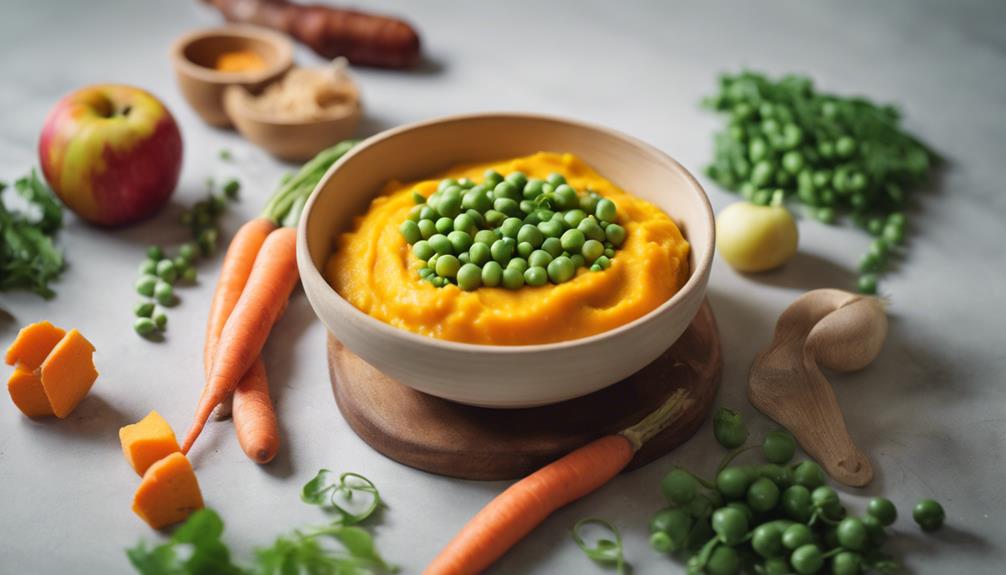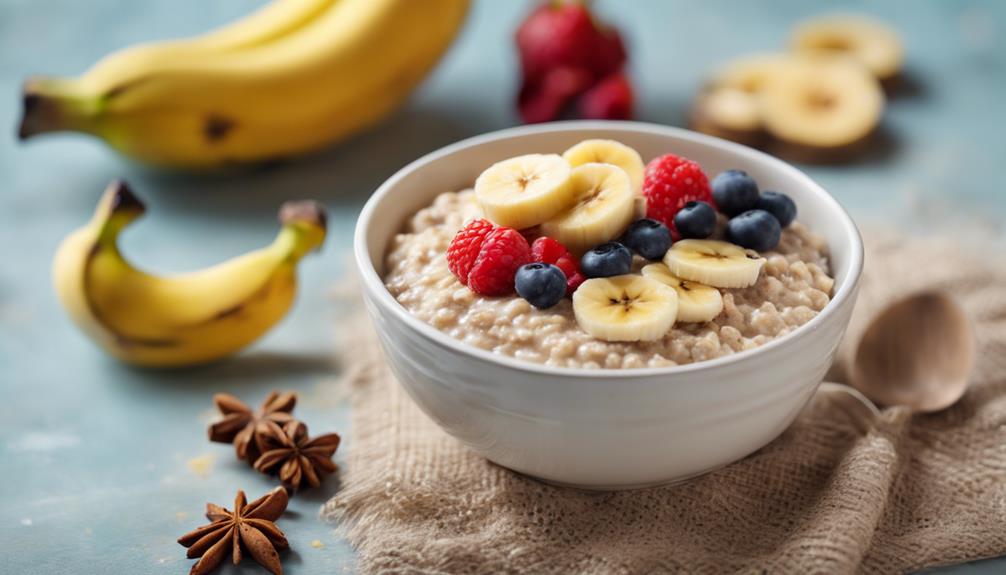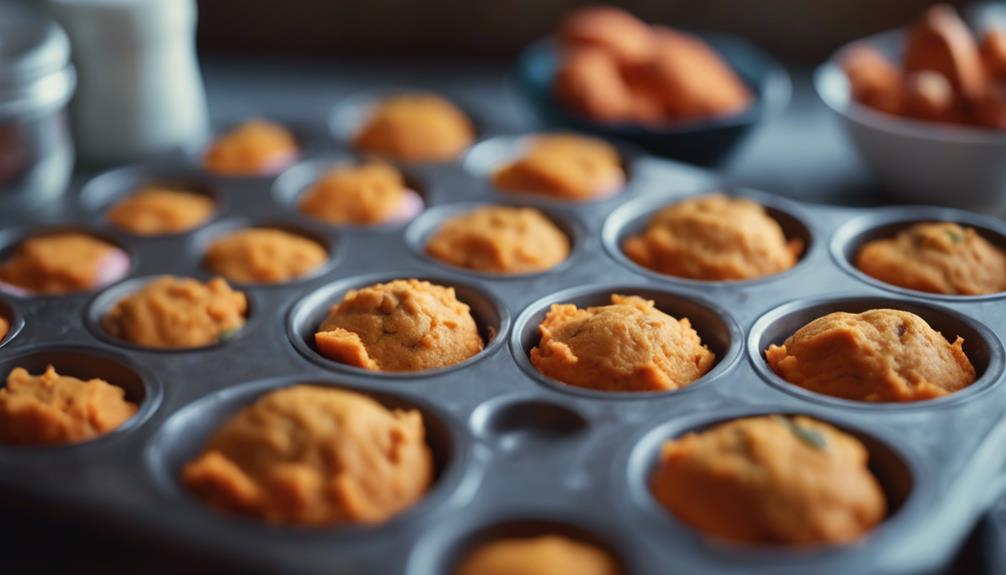When considering cranberry baby food for your infant, remember it offers key nutrients like Vitamin C and antioxidants. These elements are essential for immune system strength and reducing illness risks. Cranberries have polyphenols that possess anti-inflammatory properties too. They support urinary tract health and contain phytochemicals vital for a healthy body. Start with small amounts to observe reactions and consult a pediatrician, especially if allergies are a concern. Cook or puree the cranberries for easy digestion. Gradually introduce cranberries into your baby's diet, monitoring effects closely. Discover more about the benefits and precautions associated with cranberry baby food.
Key Takeaways
- Cranberries offer vital nutrients for babies' development.
- Introduce cranberries gradually to monitor any adverse reactions.
- Cook or puree cranberries for better digestion.
- Store cranberries properly to maintain freshness and nutrients.
- Consult a pediatrician before incorporating cranberries into your baby's diet.
Health Benefits of Cranberries for Babies
Cranberries offer a range of health benefits for babies, making them a valuable addition to their diet. These small, red fruits are packed with essential nutrients like Vitamin C, fiber, and antioxidants, which are essential for your baby's growth and development. The antioxidants found in cranberries can help strengthen your baby's immune system, potentially reducing the risk of certain diseases.
Additionally, cranberries contain polyphenols with anti-inflammatory and anti-bacterial properties, which can be particularly beneficial for babies. Regular consumption of cranberries may also support your baby's urinary tract health by helping to prevent infections. The phytochemicals present in cranberries play a role in maintaining a healthy urinary system, making them a nutritious choice for your little one.
Introducing cranberries to babies between 8-12 months can provide a flavorful and nutrient-rich addition to their diet, promoting overall well-being and health.
Introducing Cranberries to Babies
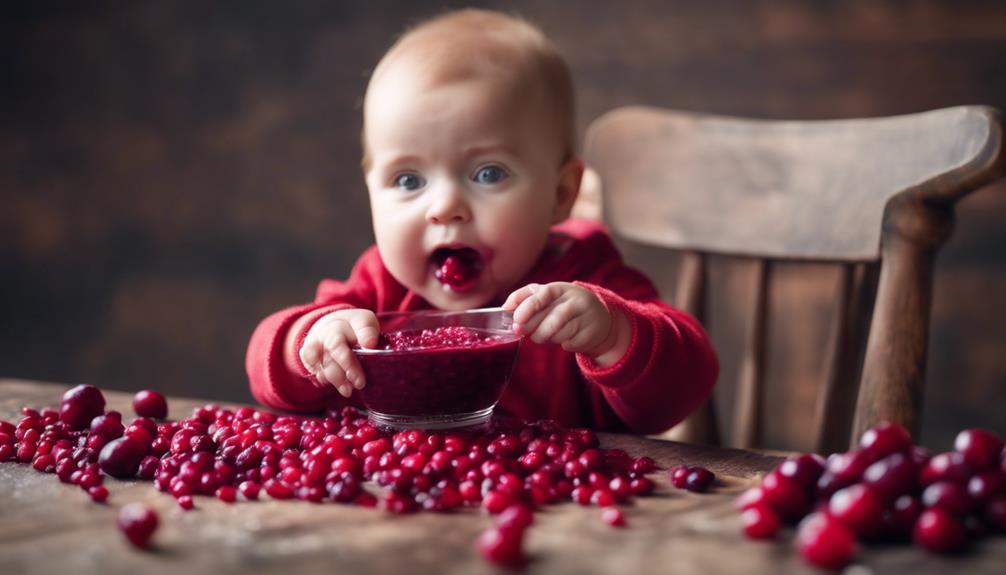
When introducing cranberries to babies, it's important to start with small amounts and closely monitor for any potential unfavorable reactions. Cranberries are acidic fruits that may not be well-tolerated initially, especially by babies between 8-12 months old.
Begin by offering a small portion and observe for any signs of discomfort, such as rashes around the mouth. It's advisable to consult a pediatrician before introducing cranberries to your baby, especially if there are concerns about allergies or sensitivities.
To make cranberries more digestible for babies, consider cooking or pureeing them. Adding water can also help reduce the acidic side of cranberries, making them gentler on your baby's stomach.
Remember to take gradual steps when incorporating cranberries into your baby's diet to ensure a smooth shift and to monitor their response closely for any unfavorable effects.
Selecting and Storing Cranberries Safely
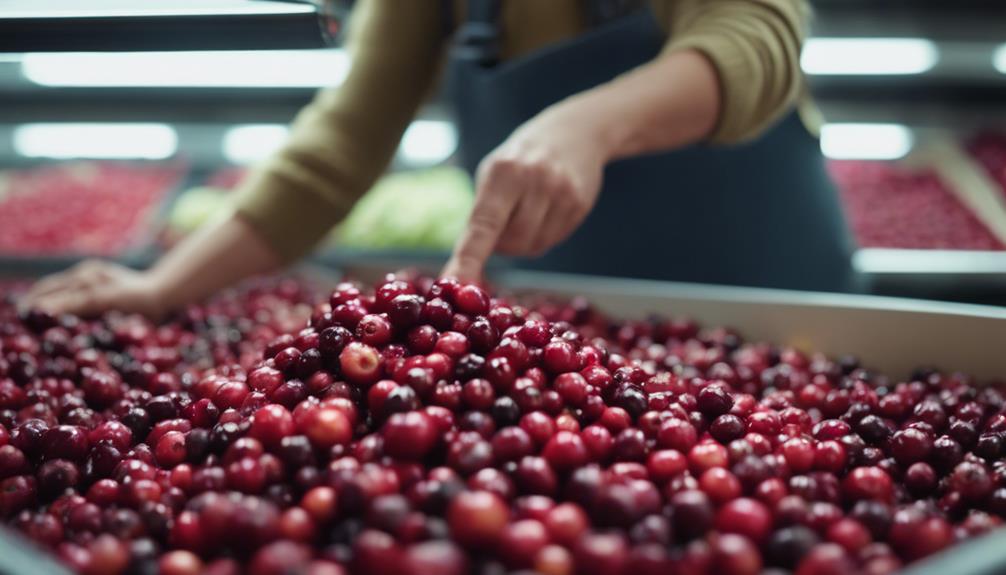
Seeking to secure the freshness and quality of your cranberries? When selecting cranberries, inspect them thoroughly for any signs of rotting or discoloration to make sure you're getting a fresh batch. Opt for deep maroon cranberries with only minor light areas, as they indicate freshness.
Be cautious with whole cranberries, especially for babies, as they can pose a potential choking hazard. To store cranberries safely, place them in the refrigerator or freezer, where they can stay fresh for up to 10 months. Freezing cranberries in their original state helps preserve their nutrients for longer periods.
If you're concerned about pesticide exposure, consider opting for organic cranberries, which are grown without being contaminated with pesticides. By following these guidelines, you can secure that your cranberries remain fresh, nutritious, and safe for consumption.
Preparing Cranberries for Baby Food
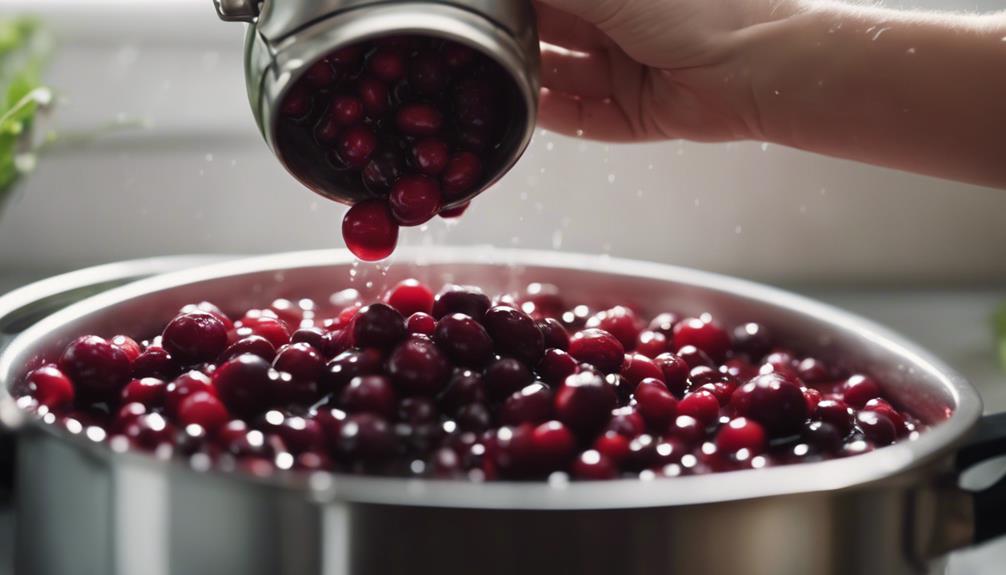
When preparing cranberries for baby food, cook them by stewing or baking with other foods to create a baby-friendly puree.
Avoid serving raw cranberries due to their tartness and potential choking hazards.
Strain and puree the cooked cranberries for a smooth texture suitable for your baby's delicate palate.
Cooking Cranberry Puree
To prepare cranberries for baby food, start by simmering them with water to soften them for a baby-friendly texture. Once the cranberries are soft, it's vital to strain and puree them to achieve a smooth consistency suitable for babies.
If the tartness of the cranberries is too strong for your baby's palate, consider adding a touch of apple juice or a sprinkle of spices to adjust the flavor.
Remember, cooking the cranberries is essential as it helps break down the fruit for easier digestion and consumption by your little one. By stewing or baking cranberries with other foods, you can create nutritious and flavorful baby food options that are rich in essential nutrients.
Experiment with different combinations to find the perfect balance of flavors and textures that your baby enjoys while providing them with the benefits of this tart and nutritious fruit.
Nutritional Benefits Highlighted
To guarantee your baby receives the nutritional benefits of cranberries in their food, it's important to highlight the rich content of Vitamin C, fiber, and antioxidants found in these fruits.
Cranberries are packed with essential nutrients that support your baby's growth and development. Vitamin C boosts the immune system, fiber aids in digestion, and antioxidants help protect cells from damage.
When preparing cranberries for your little one, consider stewing or baking them with other foods to create baby-friendly textures. Straining and pureeing cooked cranberries can make them easier for babies to consume, ensuring they benefit from the goodness of cranberries.
You can also enhance cranberry puree by adding spices or apple juice to adjust the tartness for baby palates. Mixing cranberries with fruits like apples, bananas, or blueberries can introduce a variety of flavors to your baby's diet, expanding their palate and providing a range of nutrients.
Incorporating cranberries into your baby's meals can be a delicious and nutritious choice for their overall well-being.
Baby-Friendly Cranberry Recipes
Prepare delicious and nutritious baby-friendly cranberry recipes by cooking the cranberries with other ingredients to create a soft, baby-friendly texture. When making homemade baby food recipes, it's crucial to stew or bake the cranberries to make sure they're safe for your little one.
Avoid serving raw cranberries to babies due to their tartness and potential choking hazard. Once cooked, strain and puree the cranberries to achieve a smooth consistency suitable for babies shifting to solid foods.
To enhance the flavor of the cranberry puree and cater to your baby's developing taste buds, consider adding spices like cinnamon or a splash of apple juice to adjust tartness levels. For variety, experiment with combining cranberries with other fruits such as apples, bananas, blueberries, or mango.
Introducing different flavors early on can help expand your baby's palate and make mealtime an exciting experience. Get creative in the kitchen and enjoy watching your little one explore new tastes!
Nutritional Value of Cranberries for Infants
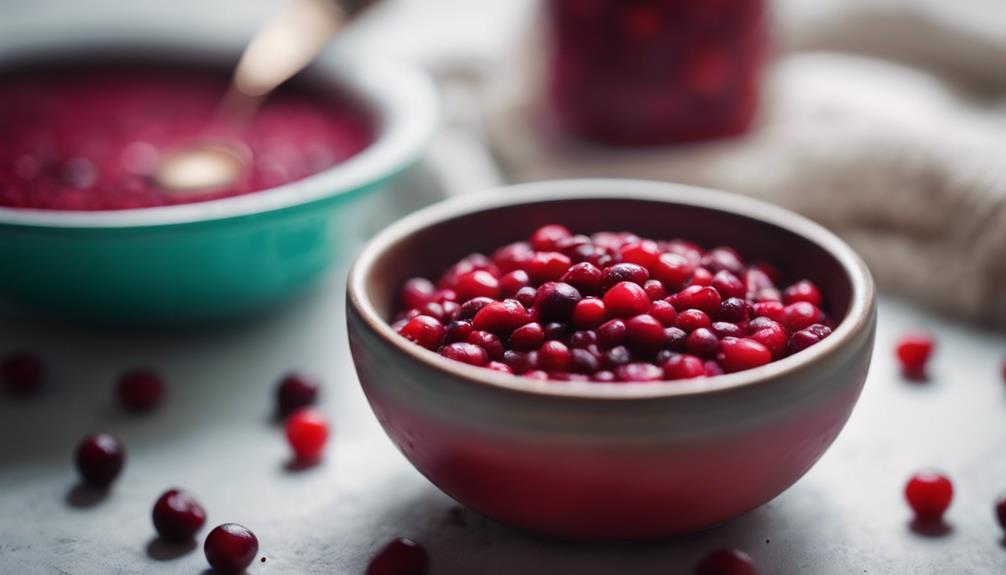
Cranberries offer important nutritional benefits for infants, including high Vitamin C content for immune support. Vitamin C is essential for your baby's immune system, helping ward off illnesses and infections.
Moreover, the dietary fiber present in cranberries aids in digestion and promotes healthy bowel movements in infants. This fiber is beneficial for your baby's developing digestive system, ensuring regularity and proper nutrient absorption.
Additionally, the antioxidants in cranberries may help reduce the risk of urinary tract infections in babies, safeguarding their urinary health. These antioxidants, along with the polyphenols found in cranberries, can contribute to overall heart health for your little one.
Introducing cranberries to infants between 8-12 months can be a great way to diversify their diet with nutritious options that support their growth and development. Consider incorporating cranberry sauce or purees into your baby's meals to reap these nutritional benefits.
Recipes Using Cranberries for Babies
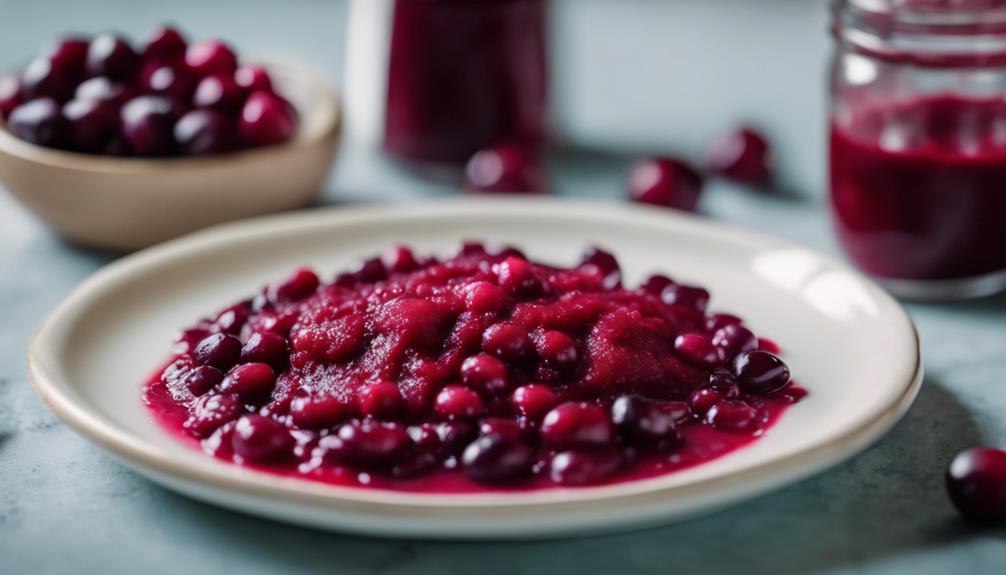
Enhance your baby's mealtime with nutritious and flavorful recipes incorporating cranberries. Cranberries can be a delightful addition to your baby's diet, offering a tangy twist to traditional baby foods. Consider mixing cranberries with fruits like apples, bananas, or blueberries to create yummy baby recipes such as cranberry applesauce or cranberry yogurt.
These combinations not only add variety to your baby's meals but also introduce different flavors and textures. For a more substantial option, try preparing cranberry couscous as a side dish. This dish can serve as a starter food for your little one, providing essential nutrients like Vitamin C and fiber that support their growth and development.
Always remember to consult with your pediatrician before introducing cranberries or any new food to your Cranberry Baby to ensure a safe and healthy shift to solid foods.
Cranberries: Safety and Precautions
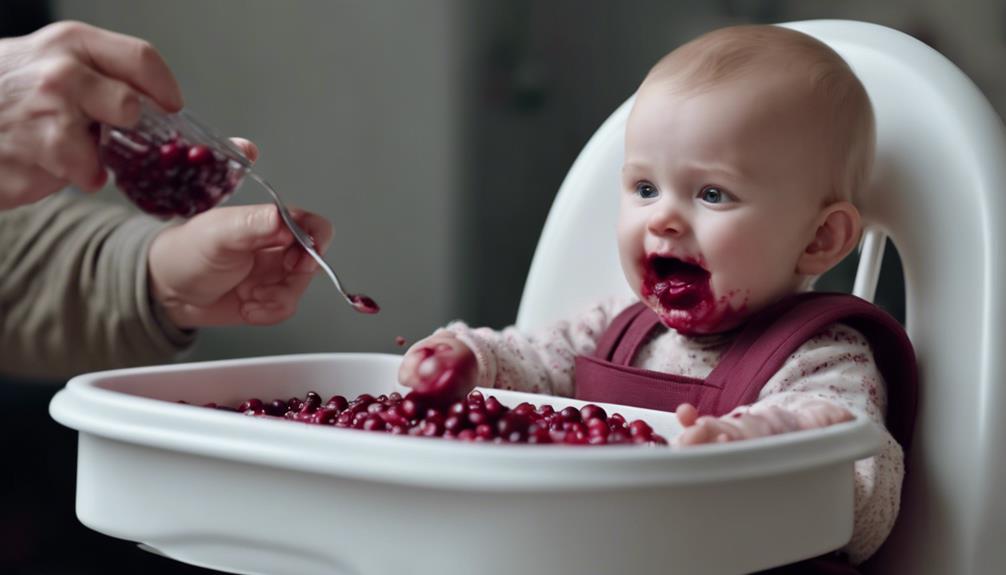
When introducing cranberries to your baby's diet, it's important to be aware of safety considerations and precautions to guarantee their well-being. Fresh cranberries can be introduced to babies over 8 months old, but due to the tartness of the cranberry, it's advisable to consult a pediatrician beforehand.
Excessive consumption of raw cranberries can lead to gastrointestinal issues in babies, so moderation is key. Babies with predisposed conditions such as kidney stone formation should avoid excessive intake of dried cranberries. Additionally, some babies may experience cross-reactivity allergies with other berries in the Vaccinium genus, so be cautious when introducing cranberries for the first time.
To reduce choking hazards, opt for cooked, mashed, or pureed forms of cranberries as a safer option, especially when shifting to solid foods or introducing finger foods. By following these precautions and being mindful of your baby's individual needs, you can safely incorporate cranberries into their diet while ensuring their health and well-being.
Cranberry Baby Food: Delicious Recipes
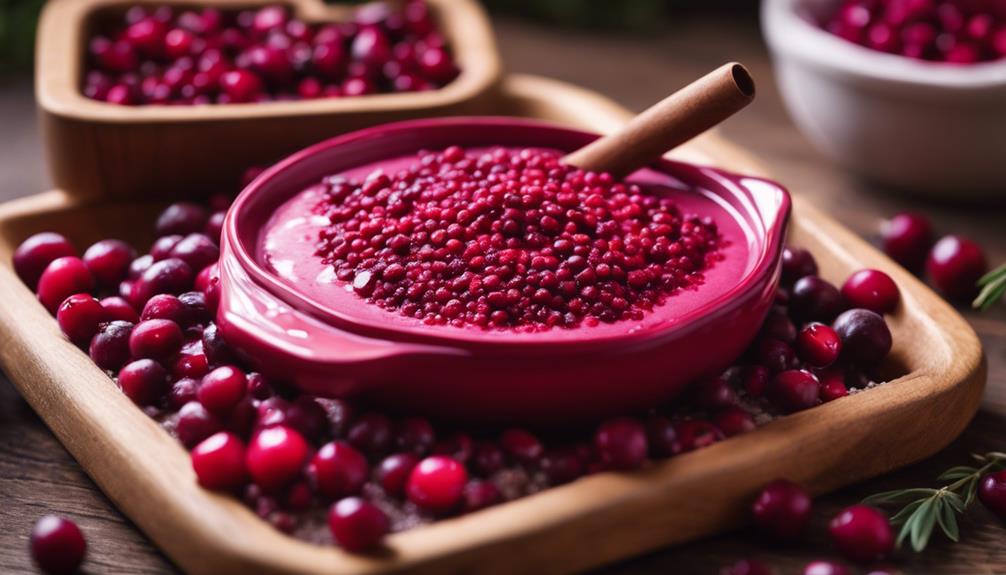
Consider incorporating cranberry baby food into your little one's diet with these delicious and nutritious recipes. To start, use a food processor to create smooth cranberry puree. Add cranberries and a sweet fruit like apples or bananas for a tasty blend that's gentle on your baby's palate.
Another option is to mix cranberries with yogurt for a creamy and nutritious treat. These combinations provide a balance of flavors and textures that your baby will enjoy while reaping the benefits of Vitamin C, fiber, and antioxidants from the cranberries.
When preparing cranberry baby food, make sure that the cranberries are cooked thoroughly to make them baby-friendly. Stewing or baking cranberries before blending them into purees or sauces helps soften their tartness and make them easier for your little one to digest.
Remember to start with small amounts and consult your pediatrician, especially if your baby has a history of food allergies. By introducing cranberries in a careful and delicious way, you can expand your baby's palate and provide essential nutrients for their growth and development.
Frequently Asked Questions
Are Cranberries Good for Babies?
Cranberries are good for babies as they are rich in Vitamin C, fiber, and antioxidants. They can help boost immunity and reduce urinary tract infection risks. Introduce them after 8 months under pediatrician guidance, cooking them for safety.
How to Introduce Cranberries to Baby?
Start slowly with pureed cranberries for babies aged 8-12 months. Watch for rashes around the mouth and other reactions. Gradually increase amounts and consult your pediatrician if needed. Remember, caution is key when introducing cranberries.
Can Toddlers Eat Dried Cranberries?
Yes, toddlers can eat dried cranberries, but be cautious. They pose a choking hazard due to their small, hard texture. Supervise closely, and opt for safer options like fresh or cooked cranberries to avoid risks.
Conclusion
To sum up, cranberry baby food offers a tangy and nutritious option for your little one. With its high antioxidant content and potential health benefits, introducing cranberries to your baby can be a flavorful addition to their diet.
Remember to select, store, and prepare cranberries safely to guarantee your baby's well-being.
Try out some delicious cranberry recipes for your baby today and watch them enjoy this vibrant and nutrient-packed fruit!

